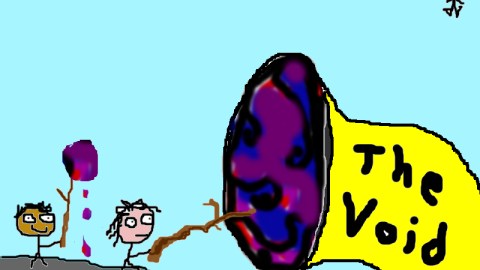Why the Edge of the Unknown Is the Best Place to Play

At one point in Marc Maron’s recent-ish podcast interview with singer/songwriter Conor Oberst (aka Bright Eyes), they talk about where songs come from. Oberst says that if you asked him to, he could sit down and write a song for you in half an hour, “but it probably wouldn’t be very good.” Then he says something I know to be true of creative work: that the best stuff comes when some little thing — an image or the sprout of an idea — lodges itself in his head and won’t let go, and at some point it’s just time to write it down. It’s the love of this spark that keeps Oberst going, and the faith that he’s got a lifetime of this kind of discovery to look forward to.
I think a lot about how data-driven we are these days. How skeptical we’ve become of being intuitive, as if Spock has finally, definitively won the ancient conflict of Spock v. Bones. Thanks to Daniel Kahneman, Dan Ariely, and other behavioral economists, we know that our instincts often aren’t to be trusted, at least when it comes to practical decision-making. We’re flawed and full of cognitive blind spots. This has left us in an odd space, constantly on the hunt for and at the mercy of the next app or web-based tool that can give us the feedback we need to perform controlled experiments and get better results. There is no sphere of life that hasn’t been touched by this new data science, and with wearable tech like the Apple Watch, it’s getting more personal all the time.
Now before someone starts objecting, let me make something plain: I fully accept that data analysis can be very, very useful, especially in conjunction with creative thinking and the kind of meta-analysis of which we humans are still the undisputed masters. I don’t have a chart to back it up, but this is likely as true in automotive engineering as it is in blogging.
I come from a family of rational skeptics, at least in the male line on my father’s side. Men who brooked no nonsense and had little time for “spiritual” or metaphysical mumbo jumbo. My grandfather was a microbiologist and a medical school professor who delighted in throwing a teeming handful of worms on his students to illustrate a lecture on parasites. My father is an MD and a toxicologist who has devoted his career to debunking false, pseudo-medical, and scientific claims (or, if you ask his enemies, denying innocent, suffering people the money they desperately need for treatment). Like them, I have deep respect for the scientific method and all it has been able to achieve. Do I want smallpox back? No. Is it good that we live decades longer than our ancestors did? I’d have to say yes. Are nuclear bombs a good thing? Not so much… but would I deny humanity the knowledge of how to split the atom so we could live again in blissful, nuke-free ignorance? No. I don’t think so.
Science is fine by me. Data is A-OK. But it’s the other, only semi-knowable element that, to me, is what makes life worth living. And it’s not just a question of AI not yet having advanced to the point where we’ve solved the problem of creativity. Semi-knowability is the point. The power of the spark is that it’s there and not there at the same time.
If we take the term “agnostic” literally, it says nothing about belief in deities or intelligent design or whatever. It makes a statement about your orientation toward the unknown. Lawrence Krauss, like many of his popular science predecessors, says that it is curiosity about the unknown that motivates him and gives his life meaning. When it comes to God, he’s an atheist, but he’s dazzled by the wondrousness and specificity of human intelligence in a universe full of gases, rocks, and nothingness. He is motivated by the possibility of answering his questions, sure, but you get the sense that he and his fellow scientists are driven primarily by a kind of faith that there will always be more questions to answer. In other words, they are driven by the unknown itself.
Whether you’re an artist, or a scientist, or something else, the danger of loving the unknown is that you might fall in love with ignorance. That lands you in the realm of vague, starry-eyed spirituality and boring everyone to death with talk of the amazing energies that surround us. For a songwriter like Oberst or a scientist like Krauss, though, the delight is in peering into the unknown, reaching in, and pulling some strange, new thing out of the darkness.
The fact that we can’t talk about it precisely doesn’t mean we shouldn’t talk about it at all. It especially needs talking about when the zeitgeist pendulum swings in the direction of hyperrationality or mysticism. The former was the kind of shift Gustave Flaubert so brilliantly parodied in Bouvard and Pecuchet, an unfinished masterpiece about two moderately educated idiots who attempt one grand, carefully mapped out progressive project after another in the fields of agriculture, science, literature, politics, and love, with catastrophic results each time. The book was conceived at the height of the Enlightenment, a historical moment (like ours) in which new analytical techniques unleashed a tsunami of idealists and charlatans dedicated to making the world a better place. I don’t live in Silicon Valley, but I imagine that if I did, the new “solutions” rolling out each day would drive me to gibbering in the town square, waving a tattered copy of Bouvard and Pecuchet. Soon there will likely be a backlash out there of apps focused on undermining all this newfound organization and productivity and restoring us to a more intuitive flow-state. Actually this is starting to happen already. Note the enormous popularity of meditation apps like Headspace.
Our trouble is that we do so love a binary. And so again and again, on the best expert advice, we rush collectively to one end or the other of the spectrum, making idiots of ourselves. But I think we’re probably happiest and most productive as a species hanging out somewhere in the middle. Like small children: awed by the unknown and at the same time unafraid to pour ketchup on it, just to see what happens.
—
Come talk to @jgots on Twitter.
And — hey! — check out Think Again — my new podcast for Big Think. Promo episode is up. Full launch 6/20.





